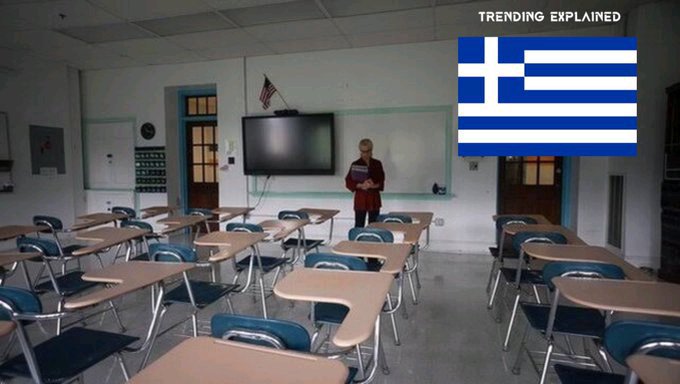According to daily Post, The Greek government has confirmed the closure of 712 schools across the country, citing a drastic fall in student enrollment linked to the nation’s plummeting birthrate. The decision, which has sparked debates about the country’s demographic crisis, highlights one of the most pressing challenges Greece faces today—its shrinking population.
For over a decade, Greece has been grappling with one of Europe’s lowest fertility rates, compounded by years of economic crisis that discouraged young families from having children. According to official data, the birthrate has consistently dropped below replacement levels, creating a ripple effect across critical sectors, including education. With fewer children entering schools each year, many institutions—particularly in rural and less-populated regions—have struggled to justify remaining open.
The Ministry of Education explained that the closures were a practical necessity, as maintaining schools with only a handful of students placed unsustainable financial and logistical burdens on the system. In some areas, schools reportedly had fewer than five students enrolled, making it nearly impossible to provide quality education or sustain teaching staff.
This development has drawn mixed reactions. Some parents and educators expressed concern that the closures would deepen inequalities between urban and rural areas. Children from small towns and villages may now have to travel long distances to attend schools in neighboring communities, raising issues of accessibility and safety. Teachers’ unions have also criticized the move, warning that it could accelerate the decline of rural communities already struggling with depopulation.
On the other hand, government officials insist that consolidating schools is the only way to ensure efficient use of resources while adapting to the country’s new demographic realities. They argue that the focus should shift toward investing in fewer but better-equipped schools, while also addressing the root cause: Greece’s declining population.
Experts link the crisis to multiple factors, including economic instability, low wages, delayed marriages, and the emigration of young Greeks seeking opportunities abroad. Demographers warn that without significant policy interventions—such as incentives for families, support for working parents, and reforms to attract immigrants—Greece could face severe long-term consequences, from labor shortages to a weakened economy.
The closure of 712 schools is not just an education issue; it stands as a stark symbol of Greece’s looming demographic challenge, raising urgent questions about the nation’s future stability and growth.
Explore More News By Using The Button Below.

